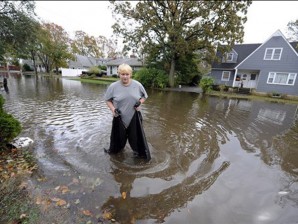Storm-battered US sifts through ‘Sandy’s’ wreckage

Sebastian Romatowski wades through knee-deep water across from his home, background, right, on 2nd Avenue that was flooded from the effects of Hurricane Sandy on Tuesday, Oct., 30, 2012, in Bayville, N.Y. At least 18 people were killed when superstorm Sandy hit New York City, mayor Michael Bloomberg said Tuesday. AP/KATHY KMONICEK
NEW YORK – Americans sifted through the wreckage of superstorm Sandy on Wednesday as millions remained without power and President Barack Obama prepared to visit areas hardest hit by the unprecedented cyclone.
The storm carved a trail of devastation across New York City and New Jersey, killing dozens of people in several states, swamping miles of coastline, and throwing the tied-up White House race into disarray just days before the vote.
Obama planned to tour flooded areas alongside New Jersey Governor Chris Christie as his Republican rival Mitt Romney was set to ease his way back onto the campaign trail in Florida after a storm-imposed virtual hiatus.
New York City authorities were meanwhile struggling to restore vital services and clear debris after a wall of storm-driven seawater flooded lower Manhattan, swamped road and rail tunnels and triggered fires.
“Restoring power and mass transit remain the two biggest challenges in the days ahead,” New York City Mayor Michael Bloomberg told reporters Tuesday, as rescue crews and utility workers surveyed an apocalyptic scene.
Article continues after this advertisement“This is the end of the downside, and hopefully from here it is going up.”
Article continues after this advertisementThe New York Stock Exchange and the Nasdaq aimed to reopen Wednesday after their first weather-related closures since Hurricane Gloria in 1985, and the John F. Kennedy and Newark Liberty international airports were set to reopen at 7:00 a.m. (1100 GMT), with limited services. La Guardia Airport remains closed.
The New York subway system, much of which was flooded by seawater, was still gripped by what management dubbed its worst disaster in its 108-year history, and the New Jersey coastline remains a scene of sprawling devastation.
Obama, who faces a tough re-election battle on November 6, was set to tour some of the worst-hit areas with Christie — a prominent Republican and Romney supporter — who described the destruction as “unthinkable.”
“America is with you. We are standing behind you and we are going to do everything we can to help you get back on your feet,” Obama said Tuesday.
On Tuesday the death toll from the storm rose to 43 in North America, in addition to the 67 people killed as Sandy swept through the Caribbean as a hurricane last week.
More than eight million homes and businesses from the Carolinas to Maine were without power, the Department of Energy said, with outages increasing as the still-formidable storm moves west towards the Great Lakes.
Insured losses from Sandy could run between seven and $15 billion (5.4 to 11.5 billion euros), according to initial industry estimates.
Three US nuclear power reactors remained shut and a fourth on alert, after storm waters wreaked havoc with transmission networks and cooling systems, but authorities insisted there were no risks to the public.
Inland, Sandy dumped three feet (90 centimeters) of snow on high ground in Appalachian states as she headed west and north, spreading blizzard conditions over parts of Ohio, Pennsylvania, and West Virginia.
In New York, residents spent Tuesday surveying the damage, confronting surreal scenes of flooded subway tunnels, a ship thrust ashore onto a railway track and cars bobbing like corks in submerged New York City parking lots.
In New York’s oceanside community of Breezy Point, the massive flooding was followed by an equally disastrous fire that destroyed more than 80 homes.
Carol Anderson, 53, whose house escaped the fire but not the flooding, had trouble identifying her neighborhood streets as she picked her way over charred beams and under scorched, dangling telephone and electrical lines on Tuesday.
“What a disaster. It’s like a warzone,” she said.
Forecasters warned that flooding would continue along the densely-populated mid-Atlantic coast and 7,400 National Guardsmen remained mobilized in 11 states to provide emergency relief.
Obama meanwhile strove to display leadership in the face of the disaster in a bid to avoid repeating the mistakes of predecessor George W. Bush, whose bungled response to Hurricane Katrina in 2005 tainted his presidency.
“Do not figure out why we can’t do something. I want you to figure out how we do something,” he told government officials during a surprise visit Tuesday to the American Red Cross in Washington.
“I want you to cut through red tape. I want you to cut through bureaucracy. There’s no excuse for inaction at this point.”